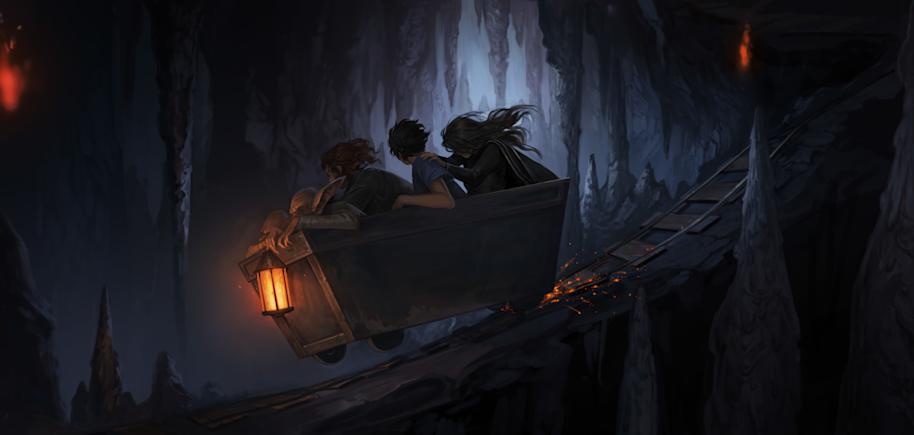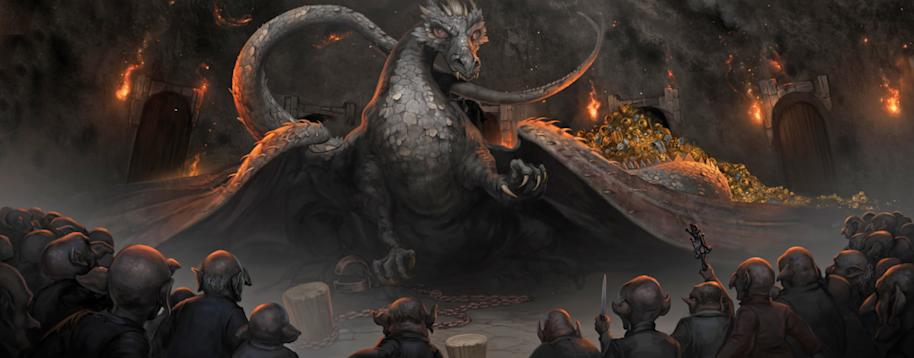In Harry Potter and the Philosopher’s Stone, Harry’s first visit to Gringotts, accompanied with Hagrid, yields many discoveries. Firstly, he learns of the world of goblins, the formidable protectors of the bank. Then there’s the fact his parents have left him vast amounts of gold. But beyond the vault doors of Gringotts, there are all manner of treasures, secrets and mysteries that have been kept safe for many, many years. As Hagrid rightly says, ‘yeh’d be mad ter try an’ rob it.’

As such, the goblins sent out a warning that is engraved across the second pair of doors of Gringotts... Here it is, in case you’ve forgotten.
Enter, stranger, but take heed
Of what awaits the sin of greed,
For those who take, but do not earn,
Must pay most dearly in their turn,
So if you seek beneath our floors
A treasure that was never yours,
Thief, you have been warned, beware
Of finding more than treasure there.
The poem is devised of rhyming couplets, which tends to be a common feature of poetry to make a verse more powerful. Indeed, the goblins’ poem packs a punch for anyone even imagining robbing a Gringotts vault for a mere moment. Here are a few ways the poem hints at future plot points in Harry Potter, and teaches us the lessons layered into the goblins’ words of caution. We’ll also take a look at just how secure Gringotts really is...
‘The safest place in the world’
Hagrid describes Gringotts as ‘the safest place in the world fer anything yeh want ter keep safe – ’cept maybe Hogwarts’, and he’s right. Gringotts has many tiers of security, depending on the preference of the wizard or witch who has stored their treasures.
For Harry’s vault, a simple key is required, whereas other vaults require a goblin’s touch to open. Apparently, if a witch or wizard were to touch such a lock, they would be sucked into the vault and trapped there, entombed with the treasure they wished to take, but unable to use it – quite the cautionary tale. And it gets more intense than that...
Be careful what you wish for

In Harry Potter and the Deathly Hallows, we discover even more dark secrets of Gringotts, such as the fact a half-blind Ukrainian Ironbelly dragon dwells deep within the bank to protect the highest-security Lestrange vault. To Harry, Ron and Hermione’s horror, they learn that the dragon is being kept under poor conditions by the goblins – and set him free while on their quest to retrieve one of Voldemort’s Horcruxes: the Hufflepuff Cup.

The cruelty put upon the dragon teaches us of the toxic depths that greed can sink to, especially within the goblins themselves, apparently the protectors of Gringotts, yet will still go to immoral lengths to keep the gold safe. Inside the Lestrange vault, Harry learns that a spell, Geminio, has been put on the Horcrux, meaning it will duplicate the object whenever touched. As Griphook says, ‘the copies are worthless’, and the expanding gold would eventually lead to being crushed to death. This spell, in itself, comments on the nature of materialism in the wizarding world – showing that excess can ultimately be meaningless, or even deadly.
‘The sin of greed’

We can look at the goblins warning in an even deeper sense than just protecting Gringotts itself. The poem foreshadows the theme of greed, which is a prevalent topic throughout the Harry Potter books. In fact, it comes rather early: think of the greed shown by the Dursley family, in particular young Dudley, who is spoilt to obscene levels by his parents while Harry is left in the dark, living a modest life.
Then there’s the greed of Lord Voldemort, who insists on surrounding himself with the most powerful and valuable magical objects, such as trying to seek the Philosopher's Stone, his desperation for the Elder Wand, even arrogantly using Harry’s blood to resurrect himself, which actually led to one of his greatest weaknesses. His insistance on using only rare artefacts of wizarding history, such as rare items once owned by Hogwarts founders, only highlighted Voldemort’s arrogance and materialistic nature even further. Throughout the stories, his facial expression is often described as ‘greedy’, whether that be for more followers, more powerful magic – or for finally mastering Death.
And we all know how Voldemort’s story worked out.
**
So, all in all, heed the words of the goblins. No good can come of greed. In fact, perhaps the goblins should heed their own words too...
Fancy visiting the great bank for yourself? Good news, then, as the Gringotts extension at Warner Bros. Studio Tour London opens this April. Check the official website for more details.



